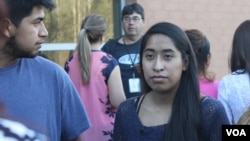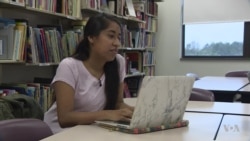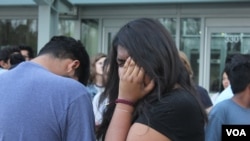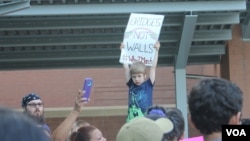“I cried,” said Itzel Gonzalez, on learning she was eligible for DACA, the Deferred Action for Childhood Arrivals program that granted temporary immunity to undocumented young people who were brought to the United States as children.
It was during her last year on high school. “I was like, I can work. I can earn some money this summer to help my mom out. ... I can go to school and get my license. I cried that day."
Gonzalez came to North Carolina from Mexico when she was 4 years old. She didn't learn her status was illegal until she was in high school and wanted to apply to colleges and get her driving license.
“My mom would be like, you can't do that. And I was just like, but why?And I have always wondered what's a social security [card]? What is that? Do I have one, do I need one?”
Watch: Life in Limbo Requires Courage
She soon discovered that without a nine-digit Social Security number issued by the federal government to U.S. citizens, permanent residents and temporary (working) residents, she could not apply to college, obtain a driving license or get a job. She was effectively shut out of the only country she really knew, where she had lived most of her life.
The Obama-era DACA, which deferred deportation and granted work permits for a renewable two-year period, was a lifeline, not only to Gonzalez but also to almost 50,000 undocumented young people in North Carolina. The Atlantic seaboard state has a high percentage of the at least 750,000 DACA recipients nationwide.
Living in limbo
DACA's survival, however, has been uncertain since President Donald Trump took office in January.
Trump campaigned on a promise to undo DACA. As VOA reported, he has since angered immigration hardliners by declaring himself divided on a "very, very tough" issue. No announcements have been made about the program's future, leaving DACA recipients in limbo.
Eighteen-year-old Edith Galvan, who has been in the U.S. since she was 6, is not letting the program's uncertain status force her into the shadows. "I have a drive for social justice and change and helping everyone," says the first-year social work major at Meredith College here.
Recently, Galvan organized her first protest for her boyfriend's father, Vicente Marcial Noyola, an unlawful immigrant and father of seven U.S.-born children. Marcial Noyola was detained for driving without a license and is due to be deported.
Chanting "Free Vicente now," about 50 people gathered in front of the Wake County Detention Center in this state capital. Standing in front of the group and the news media, Galvan introduced each of Marcial Noyola's children, who range in age from 5 to 21.
The small protest had almost no chance of convincing immigration authorities to let Marcial Noyola go, but that did not stop Galvan.
"He shouldn't be taken away from his kids, who are so young and innocent," she said.
(Update: Galvan has reported that Marcial Noyola was released from custody on May 21 after the driving without a license charge was dropped. He is back home with his children.)
Depending on DACA
Gonzalez is a senior at Meredith College. A cross-country runner, she was recruited by the school.
"I talked to them about my situation … and Meredith helped me financially a lot, and that's how I'm able to graduate in May," she said.
DACA recipients are not eligible for taxpayer-funded assistance.
Gonzalez initially wanted to go to medical school but ended up majoring in public health, finding it "more useful to do public health and help people prevent diseases."
Now she is struggling once again to see into the future. She has already started looking for jobs, mostly with the government; but the jobs require her to be a U.S. citizen.
Instead, Gonzalez says she will sign up for AmeriCorps, a government-run program that places thousands of young people in yearlong public service jobs in nonprofits, schools, public agencies, and community and faith-based groups across the country.
AmeriCorps is one avenue that is open to DACA recipients — if DACA survives.
“I don't know what's going to become of DACA,” says Gonzalez, “and I depend on it a lot.
“The things that I have gone through, I wouldn't want anybody else to go through, because I know the feeling and it's a horrible feeling, especially for kids.”
(This is the second in a two-part series from Raleigh. The first part, on immigration hardliners who want to undo DACA, can be seen here.)








